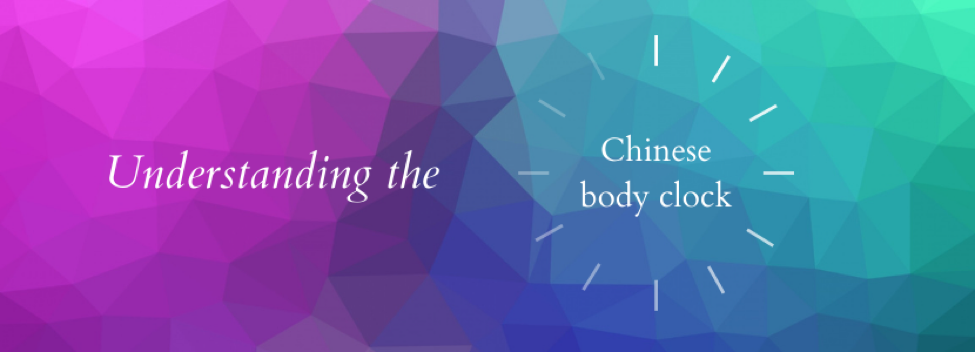
The Chinese Body Clock
Do you wake up in the middle of the night at the same time?
Have bowel movements first thing in the morning?
Do you feel tired after lunch?
The Chinese body clock may answer the “why” to these questions and many more.
A concept in East Asian medicine, the Chinese body clock believes the body has a natural rhythm of qi (energy) movement throughout each day.
Specifically, it theorizes that qi organically moves from organ to organ, peaking in each one at specific 2 hour intervals within a 24 hour period.
In addition to the physical body, mental health and emotions can also be affected by moving qi.
This means…
- There may be clues as to why you feel better or worse throughout the day.
- You may be able to support and utilize each organ to its fullest when it has the most qi.
- Small changes in everyday life that are mindful of moving qi may help heal and restore both physical and mental health.
Let’s take a look at each 2 hour interval and its associated organ/feelings:
1-3am
Organ: Liver
Emotions: Anger, Frustration
Qi moves inward during sleep and between the hours of 1-3am it settles in the liver to detoxify the blood and remove toxins.
Waking up during this time may suggest toxic overload (such as too much alcohol), energy stagnation in the detoxification pathways, and excessive yang energy (which can release cortisol).
Feelings of anger and frustration can be associated with this time of night.
3-5am
Organ: Lung
Emotions: Grief, Melancholy, Sadness
Cleansing and renewing the body with oxygen, the lungs are of focus between 3-5am.
It may also signify unprocessed feelings of grief and sadness if you consistently wake up during this time.
5-7am
Organ: Large Intestine
Emotions: Obligation, Need to be Perfect, Discouragement
The large intestine is in full swing between 5-7am in which bowel movements are normal to eliminate what the liver detoxified through the night.
Waking up with emotions about your to-do list, the need to accomplish, and how you will achieve it all can be common.
7-9am
Organ: Stomach
Emotions: Anxiety, Stress
During these morning hours, qi moves to the stomach. A healthy breakfast and a walk can support this organ.
It can also be a good time of day to focus and concentrate, however, be mindful that it may also be consulted with stress and anxiety.
9-11am
Organ: Spleen
Emotions: Worry, Low Self-Esteem
Mid-morning qi is thought to resonate in the spleen, processing breakfast in order to create more energy for the day. Clear and focused thinking can be prominent because of it.
Be cautious that worries may be more apt during this time as well as thoughts of low self-esteem.
11-1pm
Organ: Heart
Emotions: Joy, Abandonment, Despair
Lunchtime encourages the body to refuel for the remainder of the day. Circulation pumps nutrients throughout the system and a sense of joy and happiness may be felt in the emotional heart.
However, difficult feelings may also appear such as a sense of abandonment, rejection, heartache, insecurities, and a more negative outlook overall.
1-3pm
Organ: Small Intestine
Emotions: Apathetic, Vulnerable
After lunch, qi is said to gather in the small intestine to sort and digest the previous meal. The body may feel tired and less energetic throughout this process and a brief nap may be welcomed.
Emotions can drop as well in which feeling apathetic or vulnerable can happen.
3-5pm
Organ: Bladder
Emotions: Fear, Difficult Memories
Once the small intestine has processed lunch, the bladder is set to eliminate waste. A cleansing part of the day, you may feel energy begin to rise again with a refreshed push to continue with work or school.
During this detoxification, fear and upsetting memories may pop to the surface as well.
5-7pm
Organ: Kidney
Emotions: Embarrassment, Shame
Around dinnertime, qi moves to the kidneys to begin storing nutrients from the evening’s meal.
Emotions of embarrassment, shame, and unworthiness may become apparent.
7-9pm
Organ: Pericardium and Reproductive Organs
Emotions: Lust and Envy
The pericardium is the sac that surrounds the heart. This element of the body paired with reproductive organs brings qi to both the physical and emotional heart.
This may be a comforting time of day for sex, to begin relaxing, and do things that encourage connection to the heart.
Strong feelings of lust, envy, or protection of the heart may also rise.
9-11pm
Organ: Triple Burner
Emotion: Depletion
The triple burner includes the organs relating to breathing (heart, lungs, and pericardium), upper digestion (stomach, spleen, gallbladder), and lower digestion (liver, kidneys, bladder, and small and large intestines) and revolves around them working together.
This hard work can foster feelings of exhaustion and depletion, leading to sleep.
11pm-1am
Organ: Gall bladder
Emotions: Resentment
During this time, qi travels to the gall bladder in order to restore and repair cells for the next day. It releases bile needed for the liver to detoxify as qi moves to that organ next.
Emotions of resentment can cause wake up during this time as well.
Does this look at the Chinese body clock bring clues to why you may be waking up in the middle of the night at a certain time or why you are so tired right after lunch?
While this concept may not tell us everything we need to know about an individual’s health, it can be helpful part of the whole.
For more information and to talk with us directly, please call (303) 688-6698 or click here to schedule a free 15 minute phone consultation with Dr. Graves.
It may be time to listen to the clues in order to start feeling better!
The CNMA office provides naturopathic care, testing, massage, and holistic counseling to those in Castle Rock, Castle Pines, Highlands Ranch, Lone Tree, Centennial, Parker, Larkspur, Monument, Colorado Springs, and the greater Denver metro area. For those outside of these areas, virtual appointments are available.
REFERENCES:
https://www.verywellmind.com/emotions-in-traditional-chinese-medicine-88196
https://www.healthline.com/health/chinese-body-clock#research

Leave a Reply